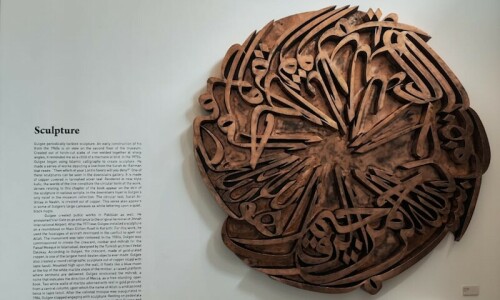 ROSARIO DE LA FRONTERA (Argentina): For Bibiana Jasbe Singh Kaur, being born and growing up an Indian Sikh in Argentina was not only a curious twist of history, it was also a culinary conundrum.
ROSARIO DE LA FRONTERA (Argentina): For Bibiana Jasbe Singh Kaur, being born and growing up an Indian Sikh in Argentina was not only a curious twist of history, it was also a culinary conundrum.
In the end, though, the predominance of Argentine beef on friends’ tables beat out the cultural abhorrence that her vegetarian Indian ancestors have against eating beef.
“It’s impossible to keep a distance,” the 24-year-old journalism student said. “We eat beef. Not at home. But at birthdays, parties, there are only steaks, which are beef.”
Singh Kaur, smiling and speaking in Spanish with an Argentine accent, was a study in the fusion of the two countries she calls home. Her jeans were paired with a loose Indian shirt, and her energetic Latina hand movements were topped by glistening dark eyes from the Asian subcontinent.
Around her were older Sikh men and women, many of them distinctly more traditional in their manner and dress. There were also younger children, playing in Spanish while wearing headwear.
They were in a Sikh temple, a gurudwara, in Rosario de la Frontera. This remote northern Argentine town is in fact home to the only Sikh temple in all of South America – a testimony to the small community from India’s Punjab region which has settled here.
The Sikhs originally came to Argentina in the early 19th century to work on a British-built railroad. Later, in the 1970s, others came after being barred entry to Canada and the United States, the preferred destinations, along with Britain, for the emigrants.
At the time, Argentina seemed the most promising of South American nations, and so they stayed, eventually concentrating in the north, which reminded them of the scrappy mountains and plains of Punjab.
Today, there are 300 of them, many of whom run supermarkets and other shops. Mixed marriages with Catholic Argentines are common. Although they are increasingly integrated, the temple is an emblem of their adherence to their roots.
This week, it hosted scores of local Sikhs celebrating the 300th anniversary of their holy book with prayer and a communal meal.
“We’ve had people visit here and they are amazed, happy. They know that what we’ve managed to do with this temple is very important, very good, for humanity – not for community, for humanity,” said Kanwal Jeet Singh, who is active in the community though he eschews a leadership tag.
He arrived from India more than two decades ago, following his father who came to Argentina in 1977.
In the gurudwara, Jeet Singh wears a turban, as does his son, Facundo.
Outside, in his day job delivering soft drinks, he sports a high cap to cover the long hair his religion demands.
But while he won’t say it, others in the increasingly diluted Sikh community acknowledge that, for all their efforts, their culture is fading under Argentina’s bright, strong sun. His son wears the uniform of the military high school he attends.
Jeet Singh’s Argentine-born cousin, Veronica Mandyp Singh Kaur, has been to India twice and proclaims: “I love my parents’ culture.”
However, she said, she left an arranged marriage to a Sikh for her Catholic Argentine current husband, with whom she owns and runs the two main supermarkets in Rosario de la Frontera.
She has two sons, one from each union. The eldest, 10 years old, proudly embraces Sikh customs and wants to visit India. But Spanish is spoken at home, leaving the children with only limited Punjabi.
“It hurts me to say it, but yes” the Sikh culture will disappear in Argentina within one or two generations, Singh Kaur said.
Hari Singh, a 34-year-old agronomist also born in the country to Sikh parents, still attends the temple occasionally, but his beard is trimmed short, and he too has developed a taste for beef.
The marriages to non-Sikh Argentines means “keeping one’s religion becomes almost impossible,” he said, adding: “I think the third generation is the one that will lose the most.”—AFP















































Dear visitor, the comments section is undergoing an overhaul and will return soon.